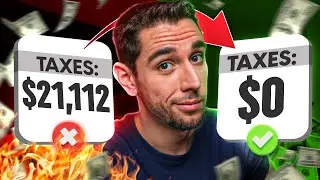Stock Market Taxes For Beginners | The Ultimate Guide
This video covers Stock Market Taxes For Beginners. By understanding these taxes and taking further action, you could save thousands of dollars in taxes. - Enjoy!
Free Investing For Beginners Guide 👉 https://dannysully.link/Investing101
Top Bonus Offers:
💎 Webull Invest: Get FREE Stocks with any Deposit! 👉 https://dannysully.link/Webull
💰 SoFi Invest: Get $25 FREE Stock when you Deposit $25! 👉 https://dannysully.link/InvestSoFi
💸 SoFi Checking & Savings: Get up to a $300 Cash Bonus! 👉 https://dannysully.link/SoFi
🛒 Rakuten Cash-Back Shopping: Get a $30 Cash Bonus! 👉 https://dannysully.link/Rakuten
Top Financial Products To Consider:
🛠 Financial Tools & Services: https://dannysully.link/FinanceTools
📈 Investing Platforms: https://dannysully.link/Investing
🏦 High Yield Savings Accounts: https://dannysully.link/Savings
🔒 Certificate Of Deposits (CDs): https://dannysully.link/CDs
💳 Credit Cards: https://dannysully.link/CreditCards
Resources:
📚 Free Learning Guides: https://dannysully.link/FreeGuides
🗞️ My Free Newsletter: https://dannysully.link/Newsletter
🔑 Patreon (My Portfolio & Exclusive Content): / dannysully
🎥 Relevant YouTube Videos 🎥
• Stock Market Investing
• Stock Market Investing For Beginners ...
• Video
• Top 10 Investing Mistakes You NEED TO...
• Roth IRA Investing For Beginners | Th...
• Mutual Funds vs Index Funds vs ETFs |...
• Stock Market Order Types For Beginner...
• Stock Market Indexes For Beginners | ...
• Traditional vs Roth IRA (Choose Wisely)
• How To Build Wealth Investing In ETFs...
⏰ Timestamps ⏰
00:00 Intro
00:10 Capital Gains
03:36 Capital Losses
06:45 Taxes on Investment Income
09:17 Mutual Funds vs ETFs
10:27 Types of Accounts
📝 What are capital gains taxes?
Capital gains taxes are taxes on the profit you make from selling an investment. The tax rate depends on how long you held the investment before selling—short-term (less than a year) is taxed as ordinary income, while long-term (more than a year) is taxed at a lower rate.
What is the difference between short-term and long-term capital gains?
Short-term capital gains are taxed at your ordinary income tax rate, while long-term capital gains, for investments held over a year, are taxed at a lower rate, which can be 0%, 15%, or 20% depending on your income.
How can capital losses help reduce taxes?
Capital losses occur when you sell an investment for less than what you paid for it. These losses can be used to offset capital gains, reducing your taxable income. If your losses exceed your gains, you can deduct up to $3,000 annually from your taxable income.
What are qualified dividends, and how are they taxed?
Qualified dividends are earnings from U.S. corporations or certain foreign companies that meet specific criteria. They are taxed at the lower long-term capital gains tax rates, which are more favorable than ordinary income tax rates.
What are the tax advantages of a Roth IRA?
A Roth IRA allows you to contribute after-tax dollars, grow your investments tax-free, and make tax-free withdrawals in retirement, provided you follow the rules. This makes it a powerful tool for long-term tax savings.
What is NIIT (Net Investment Income Tax)?
The Net Investment Income Tax (NIIT) is a 3.8% tax applied to individuals, estates, and trusts with income above certain income thresholds. It applies to net investment income, which includes interest, dividends, capital gains, rental income, and other investment-related income.
🔔 Don't forget to subscribe with notifications on and hit that like button!
Disclaimer: Certain links on this website lead to products or services that may earn Danny Sully an affiliate commission or referral bonus. As a member of an affiliate sales network, Danny Sully is compensated for directing traffic to partner websites, which may affect the placement or visibility of some products on this site. The information provided in this video is accurate as of its posting date, though some of the offers mentioned may no longer be active.
This content is for entertainment only and does not constitute legal, tax, or financial advice. It is for general informational purposes. The presenter is not a licensed professional. Viewers should consult their attorney, accountant, or financial advisor for advice on specific legal, tax, or financial issues.





![•|..Сᥴ᧐ρᥲ ..|•[Бᥙ᧘᧘/Дᥙᥰᥰᥱρ]•](https://images.videosashka.com/watch/Be4oPrfobEY)

























